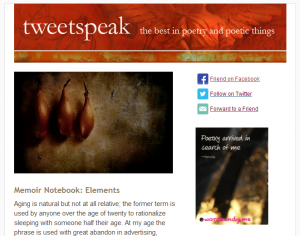Poetry Was in My Soul
Like most writers, I was drawn to language early. Mrs. Noonan, our librarian at Harry M. Fisher Elementary in Mohawk, New York read us magical books, creating a storehouse of images and sounds that brought distinct pleasure. In third grade, I read The Three Investigators series, discovering what John Gardner called “the vivid and continuous dream” of story. I knew there was more to books than escape—that good writing somehow increased me. Books offered order and meaning while wrestling with the deepest ambiguities of the self and the world; books brought me hope and put me in touch with idiosyncratic reality like nothing else did. I learned that through reading, I could, as Emily Dickinson put it, “dwell in possibility.”
I was a poor student in high school, preferring sports, girls, and motorcycles to mathematics or chemistry. Yet poetry was in my soul, if buried. English was my strong suit, and I excelled in it when I—as all my teachers liked to say—“applied myself.” Senior year, I read two books that gave me direction for my future: Salinger’s The Catcher in the Rye and WP Kinsella’s Shoeless Joe. Works like these offered the best answers to perennial coming of age questions: Who am I? Who do I want to be? What should I do? Thoreau said, “Most men live lives of quiet desperation.” That rang true in my town, and I wanted to avoid such a fate. I would go to college to study English. And I would come to poetry.
Poetry Seemed a Natural Choice
As I began writing, poetry seemed a natural choice. I felt overwhelmed with the sustained richness of novels I read, magnificent books like Jane Eyre and One Hundred Years of Solitude and Fathers and Sons. The long form intimidated me; I felt that if I would ever successfully leverage my pitiful reserve of talent in the service of creation, it would need to be on a much smaller scale…like a poem. Along with economy of form came the knowledge that poetry has been considered the highest art of language, “the best words in their best order, ” as Coleridge put it. I liked that poetry gave me achievable goals and a case to be made that I worked at the pinnacle of what language could do.
I began reading poetry in earnest, obsessing over tiny masterpieces I discovered. My spare minutes and dollars vanished at Brown Bag Bookshop and Rick’s Recycled Books and the Goodwills, Salvation Armies, and Volunteers of America stores in Rochester. I picked up beautiful volumes published by the press in town, BOA Editions—collections by William Heyen, Dorianne Laux, Li-Young Lee, Lucille Clifton, Naomi Shihab Nye. I grabbed books by famous names and names I’d never seen before and haven’t since. I took anthologies out of the library, copying by hand into a journal lines and entire poems that spoke to me. I fell in love with the soaring verse of Federico García Lorca; I carried around a beat-up paperback of Robert Bly’s Silence in the Snowy Fields. I studied journals like Virginia Quarterly Review, The Bitter Oleander, and Mudfish, along with those regal benchmarks Poetry, The New Yorker, and The Atlantic Monthly.
I filled up pages simply because it thrilled me.
Most Came Back with Form Rejections
I published my first poem at the age of twenty-one in an issue of a journal that contained work by James Tate, who had just won a Pulitzer. The satisfaction of that moment—not just seeing my name and work in print, but also joining the Great Conversation—proved too strong to resist, and I began sending out to magazines around the country. Most came back with form rejections.
I learned. I failed better. I remembered why I loved reading and writing in the first place; I tried, in one of my favorite phrases of ‘90s pop culture, to “keep it real, ” and I went from there.
I still go from there. Whether I’m taking my own kids to the library or developing new work, I try not to get cynical, overwhelmed, or seduced by fads. The wonders of literature remain true, even when my life gets messy and my mind gets ugly and I see the people around me as something other than a little lower than the angels. Like Galway Kinnell’s sow being blessed by Saint Francis, I need to re-learn beauty, and often. Poetry retains its unique ability to do just that: to instruct at the most profound levels of being. Like the boy sitting on the floor of Harry M. Fisher Elementary school library, I still delight in imagery and sound. I know that the discipline of writing poetry enables meaning and hope rather than desperation, that to dwell in possibility is a good and great gift, and that language used well increases us all.
Photo by Paalia, Creative Commons license via Flickr. Post by Daniel Bowman Jr.
Browse more Journey into Poetry
_______________________
Subscribe to our free weekly newsletter.
We’ll make your Saturdays happy with a regular delivery of the best in poetry and poetic things.
Need a little convincing? Enjoy a free sample.
- Journey into Poetry: Daniel Bowman Jr. - September 4, 2013
- Poetry Classroom: Mohawk January - May 27, 2013
- Poetry Classroom: April Poem - May 13, 2013


Maureen Doallas says
Love that concluding sentence. It is the writing itself that sustains and makes possible.
Dan says
Thank you, Maureen, and yes, the writing “makes possible.” It’s fun to work through a “journey into poetry” as it causes me to consider what I’ve done–and what I’m doing each day now–to honor that initial journey and prepare for the new ones that will come.
Tania Runyan says
The “poor student” became an amazing and successful writer. I love this piece. And I love how the world works. 🙂
Dan says
Thank you, Tania! I truly was a miserable and inconsistent student in high school. The admissions counselor at Roberts said it was my entrance essay that stood out to him. 🙂
Adele says
Loved this Dan. Makes me think of this quote by author David Grossman (which could also easily being “We read.”) — “We write. How fortunate we are: The world does not close in on us. The world does not grow smaller.”
Dan says
Thank you, Adele. I thought I’d seen ALL the writing quotes that periodically make the rounds…but I’d not seen that one, and it’s a good one, an essential point.
Hannah says
Lovely. Wondering what journal was home to your first published poem?
Dan says
Thanks, Hannah! (It was Seneca Review.)
Diana Meakem says
🙂 This is great. I especially like all the quotes. Emily Dickinson is the first poet I fell in love with. In high school, I would go on walks in my neighborhood with a book of her poems and read them under my breath.
Dan says
Thanks, Diana!
And how it warms my heart to think that there is even one person in this world who has walked around her neighborhood breathing Dickinson poems. 🙂
Katie Brewster says
“I knew there was more to books than escape – that good writing somehow increased me.”
“I learned. I failed better. I remembered why I loved reading and writing in the first place; I tried, . .
and I went from there.”
“I still go from there.”
“I know that the discipline of writing poetry enables meaning and hope rather than desperation, that to dwell in possibility is a good and great gift, and that language used well increases us all.”
True words of wisdom written here. Thank you for sharing your story, Dan.
Gratefully,
Katie